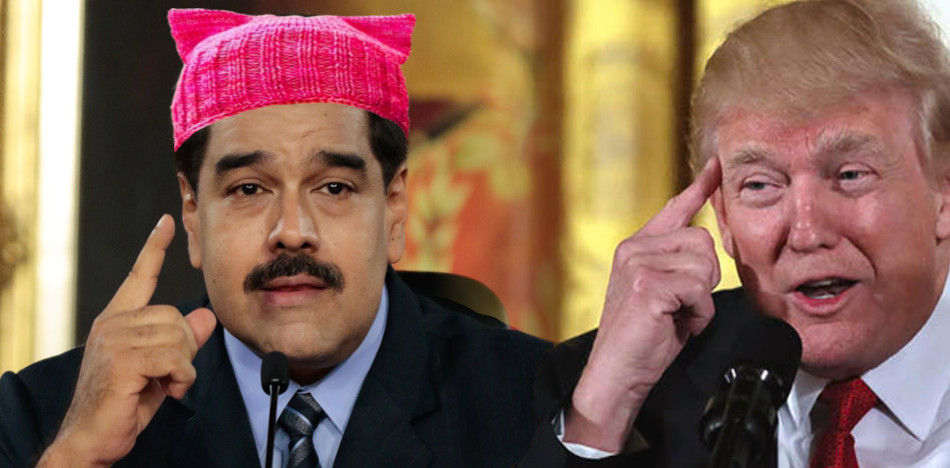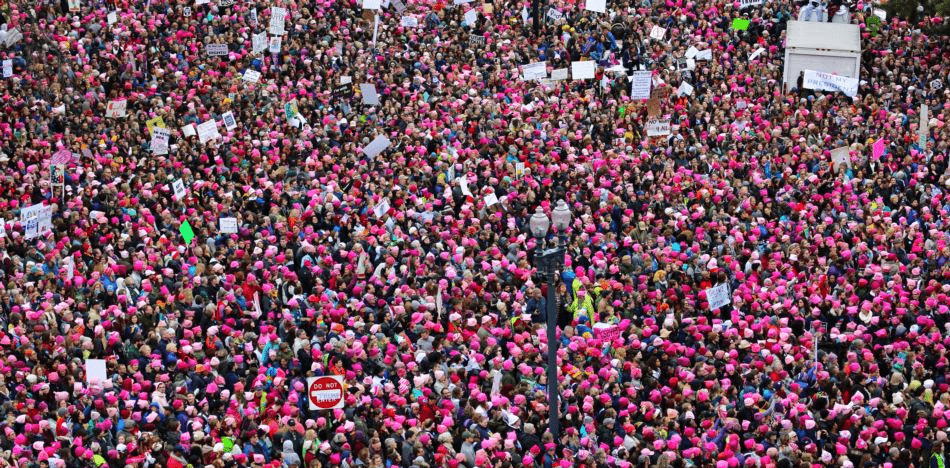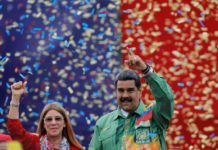The two most controversial presidents in the Americas decided to speak out on feminism last weekend.

In Venezuela, President Nicolas Maduro declared himself a feminist, and said he is and always will be “the president of women.” Donald Trump said: “I would not say that I am a feminist…I’m for women, I’m for men, I’m for everyone.”
These statements lead us to explore how the age-old strategy “divide and conquer” is applied to an ideology that divides humanity in two: men and women.
As such, various politicians take advantage of the situation to affirm themselves as heroes.
Soy y seré el Presidente de las mujeres. Me declaro feminista. No me tiembla la mano y mis ministras y ministros lo saben. No permitiré que ni una sola mujer deje de acceder a sus derechos de hoy y del mañana. #MujeresConMaduro2018 pic.twitter.com/3ewAVtJTno
— Nicolás Maduro (@NicolasMaduro) January 26, 2018
Tweet: I am and always will be the President of women. I declare myself a feminist. My hand does not tremble and my male and female ministers know it. I will not allow a single woman to stop accessing her rights today and tomorrow.
True to the Marxist dialectic of class struggle, which divides society between the oppressed and oppressors, feminism—which was born in the bourgeois spheres, like socialism—earned popularity in the lower classes by linking its discourse to victimhood. So much so that both the Communist Manifesto and the Feminist Manifesto were published in 1848 , exchanging the term bourgeois for man and proletarian for woman.
That is, for the first time in history, an ideology has managed to divide society—and therefore, humanity—in half.
Several populist leaders have managed to take advantage of it, for populism divides society between people and “anti-people.” In this way, the leader proclaims himself as the savior chosen by the people to destroy the enemy. Either they are with us or they are against us.
In Canada, for example, the openly-feminist prime minister Justin Trudeau banned pro-life candidates from his party (in 2014) as well as young people seeking the summer program (this year) who disagree with abortion, an ideal of the ideology that he promotes as a “reproductive right”. This undermines the freedom of worship of countless people, as well as freedom of expression. This promoter of diversity draws a line when it comes to the diversity of ideas.

Likewise, biased measures that differentiate women from men before the law are proliferating in the Americas and Spain. Instead of treating women with equality, weight is added to their favor on the scale of justice. Through “femicide” and “gender violence,” blind justice is a thing of the past, as is the presumption of innocence. The life and death of a man is judged differently, as is his testimony.
So much so, that in Venezuela there is the Ministry of Popular Power for Women and Gender Equality, as well as homonymous institutions in several Spanish-speaking countries. Although they proclaim equality, they do not have an equivalent for the male sex.
And, although logic dictates otherwise, to them, it is not contradictory that a ministry that promotes equality ignores the other half of the population. It is not contradictory because it responds to an ideological purpose.
But the truth is that entities like these, far from “empowering” women as their narrative claims, condemn them/us to perpetual dependence and to be a political instrument.
Two years ago, in the event “The role of women in the ideas of freedom,” Isabel Pereira from the organization Vente Venezuela, said: “Nobody suffers more in Venezuela than women, because there is no greater pain for a mother than not being able to give milk to your child. “
Given the scarcity of resources in Venezuela, everything from food to feminine hygiene products have become a luxury—not only due to their high costs, but also because they have become nearly non-existent due to severe shortages. So the regime, from the time of Chavez, uses state funds to promote micro-industries and courses in government entities to manufacture “ancestral” feminine hygiene products with methods dating back the previous century.
Meanwhile, since the election of President Trump in the United States, the most numerous feminist marches in history have been called against his administration. One of the triggers was access to contraceptives. Crowds marched demanding the government to finance their contraceptives, others for them to be covered by insurance. That is to say, it is either the State or the employer that must pay for everyone’s individual choices.
Another complaint is the cost of feminine hygiene products. Some sectors ask for “free” products, others request subsidies, and some, taxes for male products.
Meanwhile, the majority of Venezuelan women are giving birth in unhealthy conditions, such as in the middle of a hallway or on a bench. The lack of infrastructure and the most basic products has caused local indigenous women go to the border to give away their children. Others flee to neighboring countries to give birth with dignity. Still, thousands of feminists in the United States march with pink hats symbolizing female genitals in protest against their president, whom they call misogynist and racist.
However, a report from the Independent Women Forum published last month, states that black women have been the group most benefited in terms of work during Trump’s presidency.
The unemployment rate among black women decreased from 7 to 5.8% last year. Among white women, the rate went from 3.8% to 3.4% and among Hispanic women from 5.9 to 5.3%.
The saying goes that you don’t know what you have until it’s gone.
Instead of advocating for greater autonomy, to be free to choose among a variety of products and acquire them with their own resources, they look to government policies for a solution.
Despite the fact that unplanned pregnancy is greatly due to the lack of access to contraceptives in Venezuela, the regime approved an budget of 700,000 Bolívares (USD $ 3.5) for pregnant women; while the base salary in Venezuela is 248,510 Bolívares (USD $ 1.24).
In comparison to any other nation, the amount it offers is miserable; but in Venezuela, it marks the difference between life and death, and socialist leaders benefit from the situation they create. Because, the more dependent the population is, the more they will need from their government; even if it’s the government who caused the scarcity.
The bigger the government, the more it replaces the effort of families to take care of themselves, and thus replaces their role in society.
The difference between the two presidents is in the narrative. Trump does not offer policies or campaigns aimed at women or men but towards all. Work and not subsidies, autonomy and not dependence. Unemployment decreased and tax cuts put money in people’s pockets, this positively influenced women of all ethnicities.
It should be noted, then, that defending feminism does not mean defending women. That ideology, far from promoting autonomy, leads to state dependence.
Feminism does not “empower” women, it does not liberate women. Women are not being treated with equality but with supreme condescension, and men are treated with indifference.
Whether Maduro is a feminist or not, what is clear is that he does not govern for women—nor for anyone else other than those with government ties, and those who have a monopoly over available resources.













